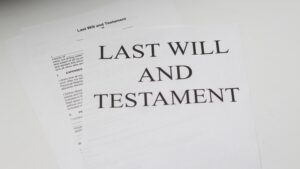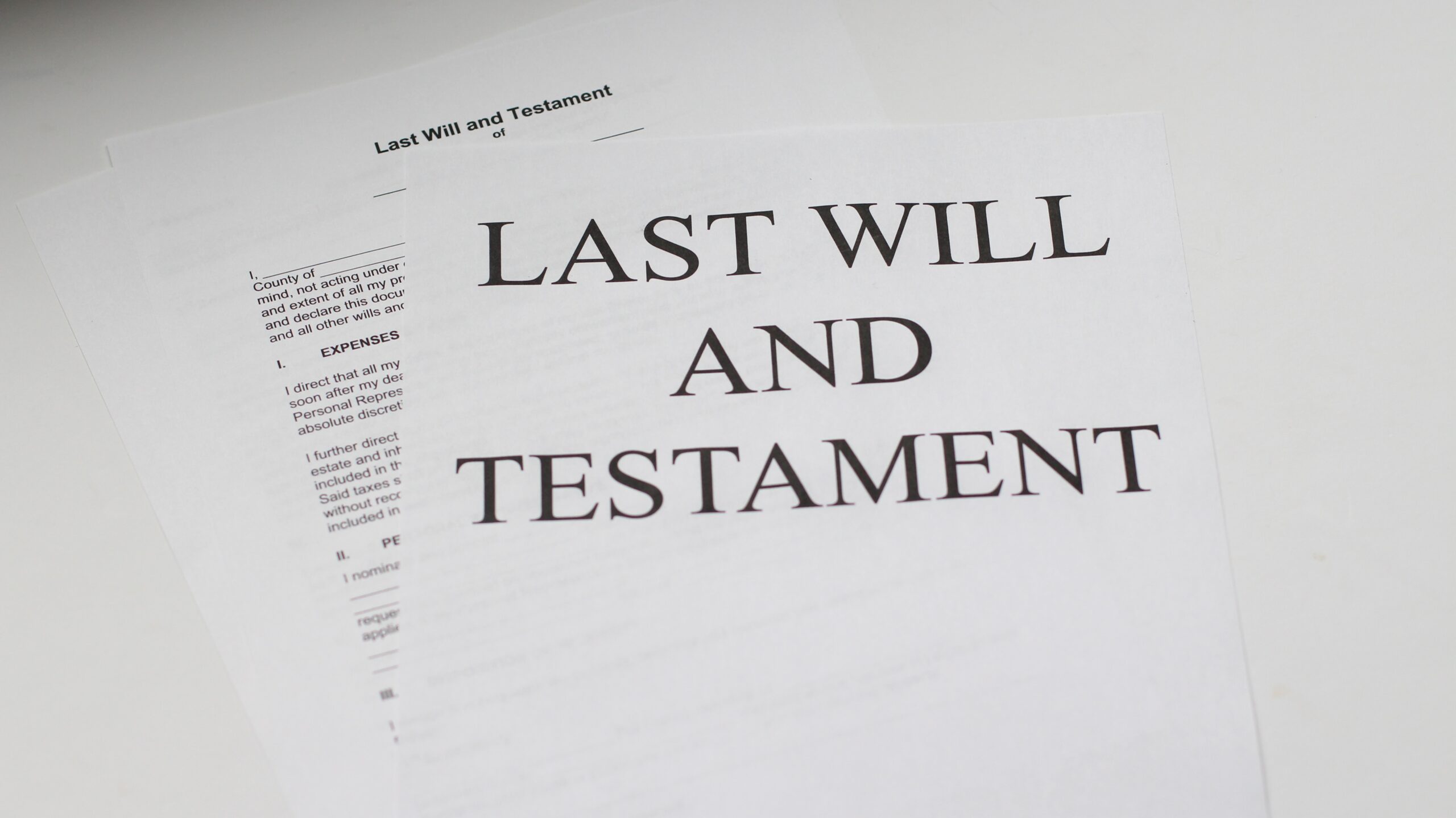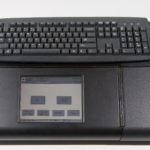This is why estate planning is so important
 “I can find a will one online . . . Easy-peasy, right?”
“I can find a will one online . . . Easy-peasy, right?”
Although one can certainly complete a will online (some a very well drafted), and it will effectively transfer your property upon your death, an estate plan is much more than a list that tells ‘who gets what.’ Proper planning provides desperately needed certainty in times of crisis, often before anyone passes away. About half of the operative instruments in an estate plan are only effective during one’s lifetime—they cease to have power upon your death. Below, I try to comprehensively outline the major components of an estate plan Please note that there is more to estate planning than what is discussed below. This article only covers the common foundational instruments of a typical plan.
Broadly speaking, an estate plan addresses two main goals: (1) empowering friends and family so they might assist you while you are living, and (2) instructing those you choose to manage your affairs in death. While there are certainly people in the world that can get by without an estate plan, if you have any meaningful assets, children, family tension, or health condition, proper preparation will make the road much easier for those closest to you. Moreover, every last one of us could suffer an injury or illness. The protection an estate plan can afford you while you’re still living is invaluable.
Below I address the most common components of an estate plan: The Power of Attorney, Trust, and Will, together with a brief discussion of planning for the care of your small children in the event of your death.
Power of Attorney
Over the years, I’ve spoken to a number of people in crisis who need a power of attorney to avoid disaster: one member of an unmarried couple desperately needing medical power of attorney to have authority to direct the treatment of an unconscious spouse; a brother who needs to liquidate some of his sibling’s stock investments, so he can afford to place his brother in the best stroke rehabilitation facility he can afford; or a daughter who needs authority to write a large check from her father’s checking account to bring his life insurance premiums current, only discovering the arrearage when dad had a brain aneurism.
Realistically, if you find yourself in a situation where you need a power of attorney, you are likely already too late to obtain one. The person who is giving their power to another, the grantor, must be competent to do so, or else the power of attorney is void and unenforceable. Although there is a legal standard to determine competence, a laymen’s instinct should not be too far from the mark.
Once an individual is no longer competent, and cannot grant power of attorney, the only way for someone to obtain authority to direct the care of another is to petition the probate court to be appointed guardian, which involves continuous monitoring and periodic hearings. Similarly, a probate court can appoint a conservator who has the authority to manage someone’s financial affairs, with similar monitoring. Moreover, where there is a challenge between one or more persons as to who should be appointed guardian or conservator, the proceedings can get quite lengthy, expensive, and detrimental to family ties.
Although powers of attorney can be tailored to nearly every type of circumstance, when an estate plan is prepared, there are typically two types drafted. The first type is a durable power of attorney. A general durable power of attorney authorizes the grantor’s agent to act in the shoes of the grantor, with wide discretion for the agent to act, so long as it is in the best interests of the grantor. Although the specific scope of the document can be tailored, most people opt to grant fairly broad authority to the agent because of the unpredictability of ordinary life. Generally speaking, however, agents do not have the authority to execute or amend estate planning documents.
The second type of power of attorney authorizes an agent to direct the grantor’s medical care in the event her or she is unable. This should not be confused with a living will or advanced directive. In a living will, the grantor outlines specific guidance on what type of medical care and degree of heroic measures he or she wishes to undergo when unable to participate in treatment decisions. Medical providers and family are restricted to act within those parameters. A medical power of attorney grants the agent complete discretion to make decisions regarding treatment based on the circumstances at the time, even decisions that could inevitably lead to the grantor’s death, such as declining a feeding tube.
Although everyone’s familial dynamics are different, and certain religious, moral, or personal values may make a living will more appropriate, my personal opinion is that giving a trusted loved one the ability to decide what is best on the then present circumstances is the best approach. In my own personal experience working in long-term skilled nursing facilities, I have cared for people whose survival is dependent upon medical devices and procedures, and who would not be deemed mentally competent, but who clearly had a high quality of life. In the event of an advanced directive declining the treatments that sustain that person’s life, he or she would have passed away. As such, empowering a very close and loving person, with whom the grantor discusses at great length their values and wishes, allows for flexibility, and in my opinion, the best outcomes.
The Trust
In most estate plans, the bulk of the heavy lifting is accomplished by a trust. This article will only give brief treatment of the subject, but for a more in-depth discussion, see my article on trusts here. In many cases, a married couple will enter into a joint revocable trust agreement. The couple, the trust’s “settlors,” create a trust which operates much like a separate individual. The settlors transfer their assets out of their own name and into the trust. The ultimate end of the trust is a distribution of wealth to beneficiaries, much like a will, but the trust do much more than a simple will.
In order to “fund” the trust, the settlors must diligently retitle all of their assets. In regards to personal property, such as household furnishings, there is no official title to transfer, so in order to officially fund this property into the trust, the settlors will complete what is called a “general assignment,” declaring that all of their property is hereby placed in trust. The legwork involved revolves around titled assets. Bank accounts are transferred from the individual names of the settlors to the joint revocable trust. Real property is a little different, in that a deed still requires a living individual’s name on the instrument. For instance, a deed would state that Andrew and Bonnie Smith transfer their marital home to Andrew and Bonnie Smith, as trustees of the Andrew and Bonnie Smith Joint Revocable Trust. The property is now in trust but remains identified as being owned by the trustees.
A brief note on investment accounts. Frequently, financial companies place your financial account into trust, allowing for the investor to file “beneficiary designations” that dictate who receives the asset upon the owner’s death. When the owner of the account passes away, the funds are distributed directly to the individuals named, outside of probate court and the joint trust. In almost all cases, having the investment funds transfer directly to beneficiaries is the best route to take. Particularly when dealing with qualified accounts: tax exempt accounts such as 401(k)s. If a 401(k) is distributed into the trust rather than directly to the designated beneficiaries, the tax-exempt status is broken, and a large amount of money is lost to taxes. This can be avoided by using a beneficiary designation, which allows the beneficiary to roll the investment over into their own qualified account.
Why do you need a trust? What benefit does it provide? First and foremost, a trust does not have to go through probate court. Probate court is a complex and public environment, requiring formal applications and petitions, and ultimately being closed upon permission of the Court. Probate court is expensive, there is an inventory fee charged based on the value of the assets being transferred. Finally, the distributions made to each beneficiary must be shown to all other beneficiaries—in fact, the record is public, so anyone with an interest could find out exactly how much money each beneficiary received.
Another valuable function of a trust is its flexibility. Sometimes, families have complex financial relationships with one another. I’ve encountered situations where the settlor loaned money to 3 of his children to purchase their first homes. These loans were complete with mortgages and promissory notes. When the settlor passed, two of the children had fully repaid the loans, the other had only scratched the surface. The loans were from the trust, and the trust held the mortgages. There was no need to go through the process of transferring all of the instruments into the name of the estate, or worse, the individual siblings. The prudent way to proceed was to keep the trust open for the duration of the loan. When a payment was made, the funds passed through the trust and were distributed amongst the other two children. Although this is an extreme case of complexity, other situations are more common. One child has a drug problem, so a continuing trust manages his funds instead of giving him a lump sum. A child is disabled, and there is a need to create a special needs trust to manage her care, which can be done within the settlor’s trust. The options are subject to only a few restrictions.
Trusts also provide a very efficient means to transfer ownership of all the grantor’s property in the event of incapacitation. For instance, if the settlor has a massive stroke, the trust has a named successor who will immediately assume control of all the settlor’s assets. Although this feature tends to overlap with the Durable Power of Attorney, the Durable Power of Attorney is still necessary to conduct new business on behalf of the settlor in situations outside of the trust property, such as renewing an insurance policy or identification card.
In sum, the trust is a very effective means to manage your assets, both in life and after your death.
Who will take care of my children?
One very important reason every parent should have an estate plan is to nominate guardians for their children in the event the parent predeceases the child. People in their 20s and 30s are not typically concerned about intergenerational wealth transfer. Similarly, the need for a medical advocate seems remote, as debilitating health issues are rare at that age. However, anyone who has watched their baby fall asleep in their arms has wondered, “Who would care for these precious children if I were gone?”
Proper planning allows you to nominate person(s) to serve in the role of guardian of your children, whether it be for periods of incapacity or more permanently upon your death. Deciding who you want to step into that role is a difficult choice, requiring extensive discussions with the potential nominees, including the provision of financial support for those children. While the will is the traditional place to declare the nominees as guardian, a properly structured trust incorporates the foreseeable needs of the children, both for immediate care and comfort, as well as post-secondary education. After all, when measuring our wealth, nothing compares to the value or our children.
For a deeper discussion on this topic, please see my article regarding the subject here.
The Last Will and Testament
The last major document in an estate plan is the last will and testament. The will is the final declaration of how the testator wants his or her property to be distributed upon death. Someone is appointed in the will as personal representative. That person must open a probate estate matter by filing the will, along with a bundle of other documents, with the probate court of the county in which the decedent last resided. This begins the process of probate administration, which requires periodic court filings, mandatory notices, and other complex, time consuming, and in the end, expensive tasks. Because of the difficulties associated with probating a will, many people elect to have trust-based estate plans.
Ever since the popularization of trusts, the will has taken a back seat as the operative testamentary document. However, even if someone has a trust, it is very important to also have a will. Typically, when a trust is involved, the will is generally a “pour-over will.” A pour-over will is designed as a catch-all, or back-stop, that ensures all property is distributed according to the terms of the trust. For instance, if someone has a trust prepared, the attorney generally funds the trust. In the case of real property, this means deeding the property from the owner, to the owner as trustee of the trust. However, suppose this person purchases a piece of property after having the trust prepared and fails to have it titled into the trust? If that person passes away with a trust and no will, the real property will be subject to the rules of intestacy. Say that one of this person’s sons is a problem gambler. To prevent the child from squandering his inheritance, the parent’s trust creates a secondary trust to maintain the child, without giving him all the money at once. A sibling could be the trustee, only giving money where it is appropriate. If under those circumstances, property was not in the trust, it would be distributed to the child with a gambling addiction without the protection of a secondary trust (this type is called a spend-thrift trust).
A pour-over will simply directs the personal representative to transfer any property that is not in the trust into the trust. Unfortunately, that means opening up a probate proceeding, but it is an effective means to protect the trust’s grantors if they fail to property fund the trust.
In Sum
If you’ve made it the entire way through this article, my hat is off to you. I hope that it has informed you of some of the finer aspects of estate planning. If you have any questions, or wish to schedule a free consultation, please feel free to contact Neumann Law Group.
Benjamin W. Bryant, J.D.
Neumann Law Group



